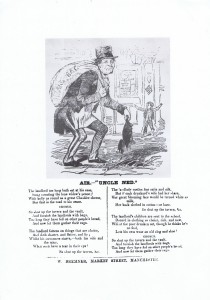Broadside Ballads are printed versions of popular song that were distributed for in the towns and cities of England for hundreds of years.
“The Ballad originated in collective worksongs. People orking together at some rythmic activity… frequently sang both to keep in time in their work and to lighten the burden” (Palmer1980: 9)
The national collection of Broadside Ballads exists across disparate collections that have been held across the UK, often for hundreds of years, by libraries, universities and other institutions. Comprising of songs that were often collected by just a few individuals who, with immense foresight, took the time to visit local singers and also collected paper copies of the penny broadsheets printed regionally. These institutions have acquired and stored a social resource that, when considered as a national collection, unwittingly forms a wealth of cultural and historical knowledge, as represented by the places, stories and characters with the ballads.
By repeatedly using well-known tunes, the songs could reach a wider audience. This also meant that publishers could pay ‘hack writers’ to add new words to existing music, saving money on the production costs as composers were rarely employed. The earliest song in The Manchester Ballads collection dates from 1785, the latest 1882, although within the wider collection of broadside ballads there are printed versions of songs that date back to 1550, and many are thought to be derived from folk songs passed down through the oral tradition for many years before they were ever printed. The earliest surviving collection of Ballads dates from 1556, and is called “ A handful of Pleasant Delights”.